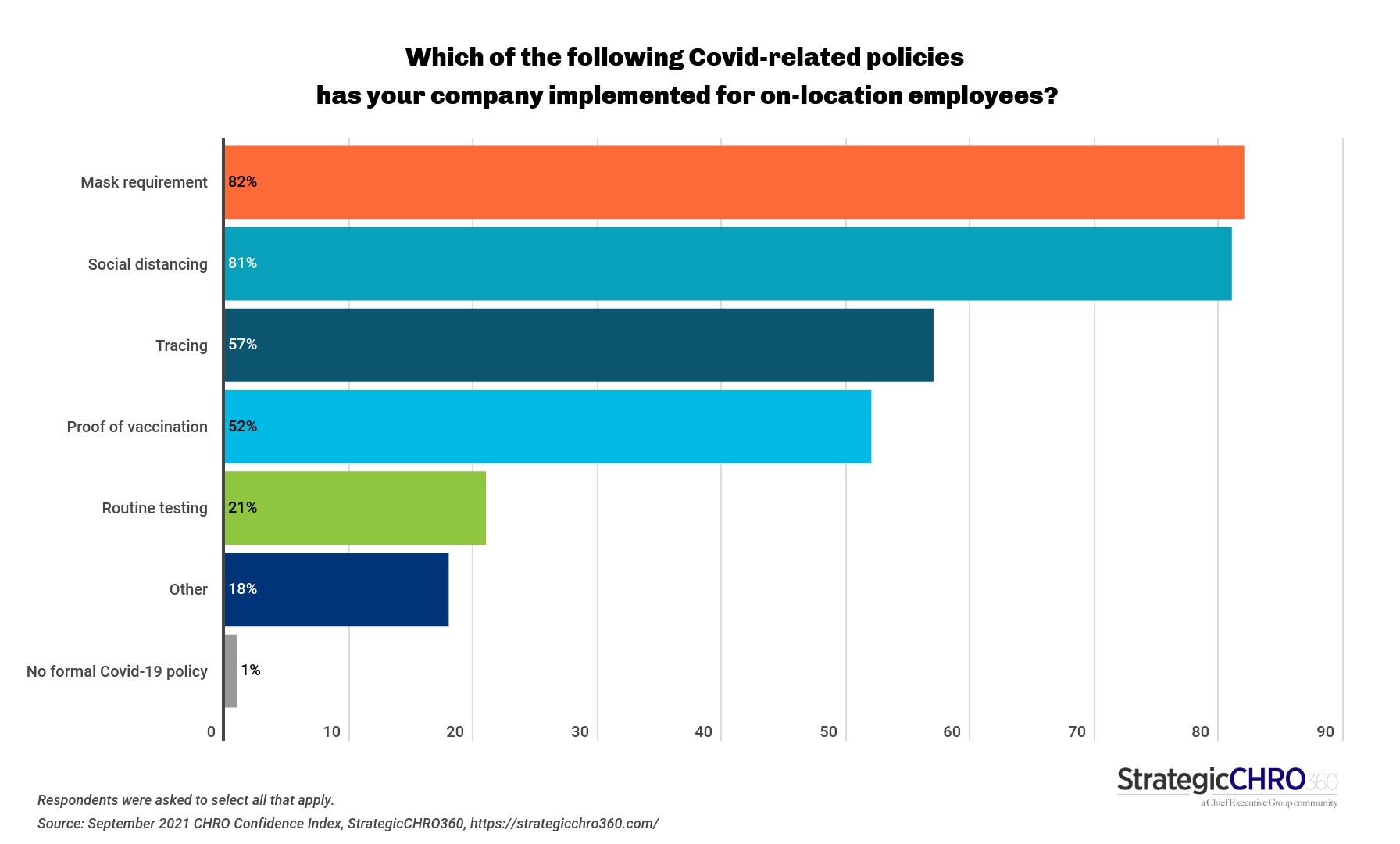As businesses weigh in on what the future of work will look like for them on the other side of Covid—remote, hybrid or on location; all employees or some employees; flexible schedules or traditional work weeks—they also need to determine how to best keep employees safe amid a resurgence of cases. As experts from the global health community warn of the possibility that Covid will be with us for years to come, companies are divided on what to do next.
According to StrategicCHRO360’s most recent polling of 119 U.S. CHROs, 4 out of 5 companies have implemented mask requirements and social distancing rules for on-location employees—82 and 81 percent respectively and by far the most popular policies across respondents. Half (52 percent) require proof of vaccination at this time, and of those who don’t, several say they are prepared to do so if needed.
“We are tracking the Biden Administration’s plans to mandate workers to be vaccinated or provide routine testing. If our customers require service or sales employees to be vaccinated, we may have to move to a mandate. Otherwise, it’s likely we will implement a testing protocol for the unvaccinated,” says the CHRO of a large global industrial manufacturer in the Northeast, adding that the company is trying to determine if the cost of doing so will then be passed on to the employee.
According to Alexander Alonso, chief knowledge officer at SHRM, while most employers share the costs with employees, there is no gold standard when pondering that decision. “When determining who should pay for mandatory testing,” he says, “the most common first step is to consider applicable federal, state and local employment laws. Although insurance may cover testing, some states require employers to pay for mandatory medical tests,” he says.
For some, mandating a vaccine has proven unnecessary.
“No federal mandates. We have treated our employees like adults, and we have seen little to no impact,” says the CHRO of a global energy corporation based in Texas, whose company requires social distancing and contact tracing to ensure the safety of all employees.
“We want every employee to be vaccinated. We are a science company, and we believe in the science. We may mandate the vaccine, but we have an employee vaccination rate of 92 percent right now,” says Struan Robertson, the CHRO of Bio-Techne, a Minnesota-based biotech, who hopes to return to on-site work as soon as possible. “We have too many people working off site right now. It’s inhibiting our levels of collaboration, innovation and making it very hard for newer and younger members of staff to build the profiles they need to effectively demonstrate their contribution and grow their careers,” he says.
“We have 50 offices in 30 countries, and we are responding to the (changing) situation on the ground for each of them,” says the HR COE leader of a large financial services firm in New York. “We do not have a blanket global policy at this time; but we do have a consistent framework,” which, he says, includes proof of vaccination, social distancing, mask requirement, tracing and “daily testing for unvaccinated; weekly testing for vaccinated employees and contractors.”
When asked how well received the policies have been among employees, 67 percent of polled CHROs say more than three-quarters of their employees are supportive. Only 8 percent say less than half their workforce approve.
“It’s very difficult to be consistent and people-centric when things are being mandated. There has to be a better approach to consider/use to get the desired results,” says Steve Brown, CHRO of Ohio-based pizza chain LaRosa’s, whose company does not have formal policies regarding Covid-19. Yet, he says more than 95 percent of employees are supportive of this decision. “Being punitive is not a good way to do business—especially in an environment when people are willing to leave their job for any reason.”
SHRM’s Alonso says the most important factors to consider when determining whether to implement mandates—and which ones—are the “safety of the entire workforce, safety of families and those not yet eligible for vaccines like children, or costs associated with treating Covid-19 in hospitals, especially if the employer is self-insured,” he says. “Each of these represents practical considerations for encouraging vaccination among the workforce.”
According to the survey data, the most common factor driving companies’ decision for mandates is indeed concern for employee health and safety (85 percent), followed by CDC recommendation (66 percent) and local and state requirements (53 percent).
“Though some organizations’ Covid-19-related policy decisions are influenced by government agencies or local/state requirements, for most, the concern for employee health and safety is the driving force behind their Covid-related policy decisions,” explains Alonso. “Many organizations are already planning for [the] next phase of the pandemic, which will likely involve discussions around booster shots, to further enhance employee health and safety.”
And the talent shortage is not helping matters, making it difficult for some companies to implement policies that can increase turnover.
“[The] mandate is creating higher labor shortages,” says the CHRO of a California defense company, whose organization has implemented requirements for proof of vaccination, social distancing, masks and contact tracing. This echoes the sentiment of other respondents who also cite the tight labor market as an additional challenge in this environment.








